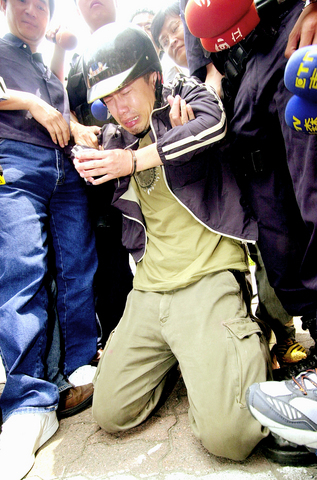Police yesterday said that suspected energy-drink poisoner Wang Chin-chan (王進展) admitted to lacing Bullwild (蠻牛) and Paolyta B (保力達B) drinks with cyanide as part of a failed attempt to extort money from their manufacturer.
"Wang was cunning and denied that he committed the crime after police detained him at noon on Thursday. But at about midnight, when I showed him a picture of Chou Yi-kuei (周乙桂) [who died after drinking Bullwild], Wang was shocked. He suddenly kneeled down, cried and said, `I did the wrong thing,'" Criminal Investigation Bureau (CIB) commissioner Hou You-yi (侯友宜) told reporters.
Hou said he then asked Wang, "How and where did you get the cyanide?"

PHOTO: LIAO YAO-TUNG, TAIPEI TIMES
Wang replied that he obtained it from China. He said a Chinese national, Zhang Chi (章池), gave him 300g of cyanide after bringing the poison into the country in hundreds of capsules.
debts
Wang told police he had more than NT$1 million (US$32,000) in debts. His plan had been to poison the drinks and demand money from the manufacturer.
Police said Wang claimed to have had no intention of killing anybody, and so made stickers reading "I am poisonous, don't drink" and placed them on the bottles.
Wang allegedly told police that after Chou had died and police released security footage of Wang in various convenience stores, he became afraid and abandoned the plan to extort money from the company.
Police yesterday found a draft e-mail on Wang's computer at his residence in Taipei County.
The e-mail demanded that Paolyta Co pay him NT$10,000,000 (US$320,000), but the e-mail had not been sent.
Wang allegedly told police he had also planned to make threatening calls from China in which he would direct the beverage company to deposit money in a China-based account.
Police added that Wang committed the crime on May 17.
He left for China on May 19 before returning to Taiwan last Tuesday.
After searching Wang's home, police also found hats, dark glasses and pants similar to those he apparently wore in the security tapes.
Police yesterday morning paraded Wang before reporters outside Taichung police station before escorting him to the prosecutor's office.
`too late'
Wang kneeled down and cried, saying, "I am very sorry for the wrong thing I did to the victims and the public. But now it's too late to be regretful."
Police said Wang robbed a bank at CKS International Airport in 1993. He stole more than NT$5 million, but was arrested eight days later.
Wang was sentenced to 10 years in prison, and was paroled in 2003.
Police said that Wang had lied about the existence of an accomplice in the robbery, and they were therefore examining whether "Zhang Chi" really existed or had any part to play in importing cyanide.
Meanwhile, the Mainland Affairs Council called on the Chinese authorities to help the government investigate the possibility that a Chinese accomplice was involved.
Council Vice Chairman You Ying-lung (

A Taiwanese software developer has created a generative artificial intelligence (AI) model to help people use AI without exposing sensitive data, project head Huang Chung-hsiao (黃崇校) said yesterday. Huang, a 55-year-old coder leading a US-based team, said that concerns over data privacy and security in popular generative AIs such as ChatGPT and DeepSeek motivated him to develop a personal AI assistant named “Mei.” One of the biggest security flaws with cloud-based algorithms is that users are required to hand over personal information to access the service, giving developers the opportunity to mine user data, he said. For this reason, many government agencies and

The National Fire Agency on Thursday said a series of drills simulating a magnitude 8.5 earthquake would be held in September to enhance the government’s emergency response capabilities. Since earthquakes cannot be predicted, only by continuously promoting disaster prevention measures could Taiwan enhance its resilience to earthquakes, agency Director-General Hsiao Huan-chang (蕭煥章) said in a news release. The exercises would be held to mark annual National Disaster Prevention Day on Sept. 21, the aim of which is to test Taiwan’s preparedness and improve its earthquake resilience in case of a major temblor, Hsiao said. As part of those drills, an earthquake alert would

DEFENSE: The National Security Bureau promised to expand communication and intelligence cooperation with global partners and enhance its strategic analytical skills China has not only increased military exercises and “gray zone” tactics against Taiwan this year, but also continues to recruit military personnel for espionage, the National Security Bureau (NSB) said yesterday in a report to the Legislative Yuan. The bureau submitted the report ahead of NSB Director-General Tsai Ming-yen’s (蔡明彥) appearance before the Foreign and National Defense Committee today. Last year, the Chinese People’s Liberation Army (PLA) conducted “Joint Sword-2024A and B” military exercises targeting Taiwan and carried out 40 combat readiness patrols, the bureau said. In addition, Chinese military aircraft entered Taiwan’s airspace 3,070 times last year, up about

STRICTER ENFORCEMENT: Taipei authorities warned against drunk cycling after a sharp rise in riding under the influence, urging greater public awareness of its illegality Taipei authorities have issued a public warning urging people not to ride bicycles after consuming alcohol, following a sharp rise in riding under the influence (DUI) cases involving bicycles. Five hundred and seven people were charged with DUI last year while riding YouBikes, personal bicycles, or other self-propelled two-wheelers — a fourfold increase from the previous year, data released by the Taipei Police Department’s Traffic Division showed. Of these, 33 cases were considered severe enough to be prosecuted under “offenses against public safety,” the data showed. Under the Road Traffic Management and Penalty Act (道路交通管理處罰條例), bicycles — including YouBikes and other